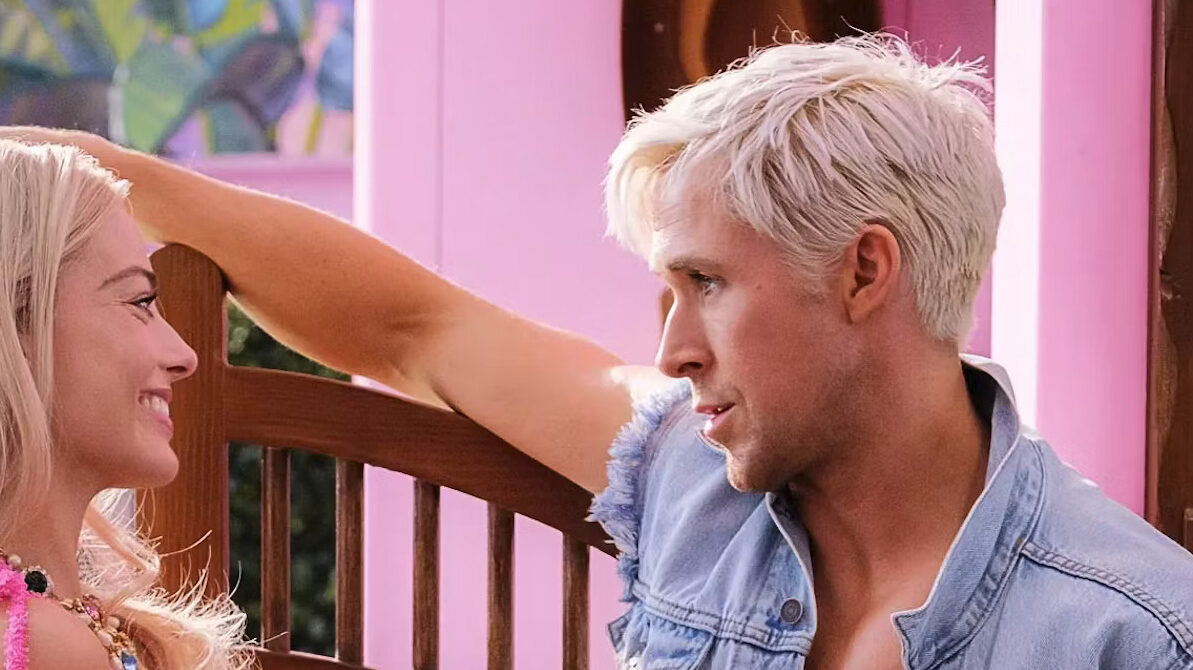Nearly every review of Barbie has mentioned the “scene-stealing” performance of Ryan Gosling as Ken, who is, without a doubt, more alive than anything else in the movie. The reason being that Ken wants something—if only to be seen, for himself, “the man behind the tan.” Barbie is mainly about Ken.
The switcheroo is clever, and funny; this time it’s the man who can’t exist outside the female gaze. Ken’s struggle to break free of oppression will be as familiar as it is strangely touching. Margot Robbie is impressive as Barbie—perfect in every frame—but in sharp contrast to Ken, her key quality is her disillusionment, and the uncertainty that comes with it. These negative feelings leave an emotional vacuum at the center of the film. Without a fully-realized protagonist in Barbie, the spurned and lovelorn Ken is left to develop the story’s momentum on his own.
It’s a gorgeous, lushly imaginative movie on the visual side, but Barbie winds up obliterating the very dreaminess that makes Ken irresistible by replacing his romantic heroism with “empowerment”; he learns from Barbie that it’s fine to be alone, that he is Kenough, all on his own; his narrative arc is a mirror of the most banal Eat Pray Love, store-bought, Slay Queen, You Go Girl feminism.
Women don’t need men, you know; something something a fish and a bicycle, from the Seventies. The movie has this whole cringemaking Pantsuit Nation vibe, complete with Kate McKinnon in a central role as the wild and crazy soothsayer, Weird Barbie. Who’s not at all weird, by the way. Barbie is a corporate product right down to its branded pink knickers, and there’s no chance Mattel would ever permit a story to interfere with the merch. So, no discussion of Barbie-adjacent topics such as consumerism, or the environmental toll of fast fashion, or plastic pollution. And despite all the self-conscious queer coding, there’s not even the barest nod to IRL lesbianism—a familiar and everyday dimension of real-life playing with Barbies, but one whose depiction would likely hurt toy sales.
The movie’s fizz and giddiness and prettiness is enough to cover over most of its defects, save the one; nobody can ever really be Kenough, all alone; there’s nothing weak about wanting something beyond yourself. Just the opposite, in fact. That’s a power of its own, and it’s a pity that this real insight, implicit in Gosling’s performance, is tossed aside in favor of the tepidly delivered message that amounts to little more than Men Bad Women Good.
Barbie may have meant to enclose “progressive” ideas in a corporate envelope, but the movie’s politics are a total fiasco.
So ok, the Kens’ attempted takeover of Barbie Land is foiled in the end by the Barbies, who fool the Kens into forgetting to do their coup in time (somehow there is a curfew on the coup) by “leading them on” in a kind of reverse-Lysistrata move. The denouement of this movie is a literal constitutional crisis, in other words, though it’s impossible to imagine what the Barbie Land constitution looks like (do Kens even have voting rights?) By the end, Barbie Land is revealed as a dysfunctional, corrupt, duplicitous autocracy, and the story ends with its original power structures in place: the Kens grab power from the Barbies, who in their turn shamelessly deceive and overthrow the Kens.
This is no way to run a toyland!!
Once they have been persecuted by the Kens, you’d think the Barbies would understand what that means but their politics don’t change, and don’t evolve; they can’t see they’d been oppressors themselves. The far-right’s accusation that Barbie is anti-men has consequently an unpleasant grain of truth in it. The story’s contempt for cis men is mainly joshing and good-natured, but at various points it acquires an edge of real animosity, as in the case of Gloria’s dimwitted milquetoast husband (“El Esposo de Gloria” according to IMDb), played by America Ferrera’s IRL husband, Ryan Piers Williams. There’s no place, no role or even a name for him in the fantastical paradise of Barbie Land. Also, this is just an aside but I super do not love mocking white people who try to learn Spanish. Gerwig grew up in Sacramento, and I am really shocked that any native Californian would have written those scenes. Taking the trouble to learn, that deserves love and praise, for everyone to learn each other’s languages.
Surely a movie for children that ends with the promise of a newly-built society in which both Kens and Barbies can find love (of any kind they like), and also vote, would be miles better than this wall-to-wall solipsism and political chaos?
There were very few men in the audience in the theater where I saw Barbie, and many little girls and their moms, most of them in pink; a festive atmosphere, with lots of pretty clothes, face painting, and glittering tiaras. I can’t imagine what they all made of this sweetly entertaining, but also sick, sad, and crazy movie. It’s a cinematic wonder, brimming with candy colors and beautiful people and costumes, and dancing, and dazzling music, so that it’s easy to race past its failures. But at the end there is Billie Eilish, singing a lovely song that has Barbie asking, “What was I made for?” Still a good question, and one for which the movie has no answer.






